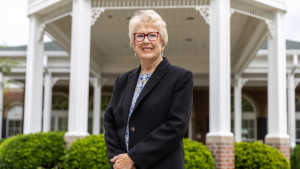SSON study finds health benefits of ‘aging in place’ at TigerPlace
Care at independent living facility helps older adults avoid declines in physical, mental and cognitive health outcomes.
June 1, 2022
First published May 27, 2022 by Show-Me Mizzou. For more information contact: Brian Consiglio, 573-882-9144, consigliob@missouri.edu
The American Association of Retired Persons (AARP) found the majority of older adults want to stay in their own home as they age. However, given the natural decline in health that comes with aging, some older adults may have to move into a nursing home or assisted-living facility to receive more intensive levels of care.
To help older adults live independently as they ‘age in place,’ researchers at the University of Missouri analyzed eight years of health data from 2011 – 2019 for more than 190 residents at TigerPlace, a senior living facility developed in partnership between the MU Sinclair School of Nursing and Americare Senior Living.
Researchers found that because registered nurse care coordinators were able to identify illnesses early and quickly in residents and provide them with appropriate care and services, most of the older adults living at TigerPlace were able to stay healthier longer, which allowed them to comfortably ‘age in place’ and reduced their need to be transferred to a nursing home for more intensive levels of care.
TigerPlace combines the convenience and privacy of individual apartments with many recreational and socialization opportunities, such as sports bars, fitness centers, live music performances, pet therapy visits, dominoes, Bible study, bingo, volunteer opportunities and programs with local churches.
The residents at TigerPlace received health assessments from registered nurse care coordinators every six months related to cognitive functioning, completing daily tasks, depression, the risk of falling and physical functioning. Additionally, some residents chose to use noninvasive motion, bed, and depth sensors to trend level of activity, respiratory and heart rate, and fall detection. Changes in activity, new or increased falls, and assessment were used to identify illnesses, such as pneumonia or a urinary tract infection, as early as possible so interventions could be provided quickly.
“The benefits of both the regular health assessments and use of non-invasive sensors helped to keep them steady as they age comfortably,” said Lori Popejoy, lead author on the study and an associate professor in the MU Sinclair School of Nursing. “The goal is to identify slight declines in health as early as possible so the right services can be put into place, whether it is connecting them with a doctor, beginning therapy or starting treatment to depression, whatever is needed based off the assessments.”
Popejoy added the exercise and socialization opportunities available at TigerPlace help improve both physical and mental health outcomes, as well as reduce the risk of falls by improving muscle mass and strength. The average age of study participants was 84.
“The residents are able to use these services to enhance their quality of life in retirement, which allows them to live longer independently,” Popejoy said. “For older adults that are still living at home and maybe starting to notice increased difficulty completing daily activities, or for those who are struggling with social isolation, moving to a facility like TigerPlace can be very helpful for living a healthier life longer and possibly avoiding the need to ever move to a nursing home.”
The research study was interdisciplinary in nature, involving collaboration among nursing students, medical students, social workers, engineers and information technology professionals.
With May being ‘Older Americans Month,’ Popejoy has dedicated her career to improving the quality of care for older adults. She has provided hands-on clinical care in a variety of health care settings, from hospitals and nursing homes to community centers and home health care agencies.
“Longitudinal analysis of aging in place at TigerPlace: Resident function and well-being” was recently published in Geriatric Nursing.


